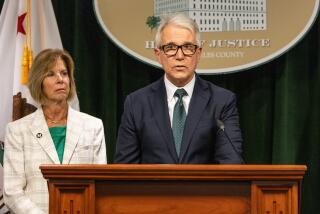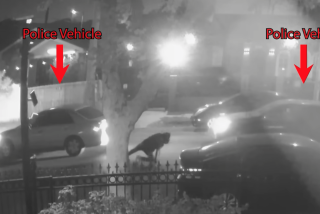Year of Searching Ends in Grief
For 333 days, the body of Armando Chapal Ramirez lay forgotten and decaying in the morgue at Robert F. Kennedy Medical Center in Hawthorne while his family searched for him.
Ramirez’s father said he had taken a photograph of his 21-year-old son to the hospital, two miles from the family home, in the days after his son’s disappearance.
No, he was told, your son is not here.
But Armando Ramirez, identified as John Doe, was in the hospital’s intensive-care unit after paramedics had found him wandering near the Century Freeway, high on cocaine.
Hospital officials said they could not identify the young man at the time. Ramirez, however, had his last name tattooed on the back of his neck.
Eleven months later, the body of Ramirez was discovered in the hospital morgue and turned over to the coroner’s office. It took investigators five weeks to identify the decomposed body, which had been kept at 40 degrees but not embalmed.
On Oct. 24, more than a year after Ramirez disappeared, his family was told of his death. The body was in such a state of decomposition that the family was not allowed to view it.
The hospital “had him there the whole time down there. Meanwhile, we were suffering day and night, waiting for the worst,” said Ramirez’s father, Jesus, 45, a stock clerk in Gardena.
Ramirez “didn’t have an ID; he didn’t have anything. But he had a name. He had a family. He had been to that hospital before,” said Ramirez’s mother, Luz Elena, 45, a housekeeper at a Culver City hotel. “So what happened?”
Hospital officials told family members that the attending physician left on maternity leave around the time Ramirez died. When the doctor returned, she found that his body had never left the morgue.
A hospital spokeswoman told The Times that the facility is unable to explain how Ramirez’s body was overlooked for so long.
“We are in the process of investigating,” said Carla Singleton Turner.
Douglas Shaffer, an attorney for the Ramirez family, said the hospital had violated a state law that requires medical facilities to transfer bodies to the coroner’s office after any unusual death, including one involving drugs.
“It’s the height of incompetence and neglect,” Shaffer said.
A Father at 16
Armando Ramirez dropped out of Hawthorne High School in the 10th grade.
At age 16, he became a father and named his son Daniel.
He joined a gang and had the name of the group tattooed on his back -- a secret he kept from his family for several years. He had the name of his son’s mother, Veronica, tattooed on his right leg.
When he and the boy’s mother separated, he remained close to his son, family members said.
Ramirez taught Danny to play soccer, a sport Ramirez had played at Lennox Middle School. He doted on the boy, now 5, helping him learn the alphabet, the names of colors, how to write his name, family members said.
Ramirez’s parents and his three sisters hoped the boy would be the push Ramirez needed to stop smoking crack cocaine.
Ramirez would go on a cocaine binge for two or three days every month or so, his father said.
Ramirez would usually call one of his sisters during his binges and ask them to tell their mother not to worry. And though he would return home exhausted, Ramirez remained robust in appearance and health, his family said.
Coping with their son’s addiction was never easy. Ramirez occasionally snapped at them and brooded. Although he was well-known in the neighborhood, he had few friends, spending most of his time with his son, who lived with Ramirez and his parents.
“We tried so hard to change him, to teach him how to be a better man,” his mother said.
On Sept. 30, 2001, the Ramirez family gathered in the backyard of their Hawthorne home for a barbecue. Ramirez and his father cooked.
Sometime after midnight, Ramirez slipped out of the house. When his family realized he was gone, they waited for his usual phone call. It never came.
His parents began driving around the neighborhood, inquiring at several area hospitals. For a year, they said, they jumped every time the phone rang. Danny Ramirez would ask, “Where’s my daddy?” He was told that no one knew. The boy would shrug and say, “I know he’s coming back.”
Jesus Ramirez filed a missing-person report with police. He said he was haunted by his son’s absence. “He was always with me, all the time,” Jesus Ramirez said.
The parents, along with other relatives, spent nearly a year looking for Ramirez in the Hawthorne area, thinking he was disoriented and lost. Each day, they slowly drove the streets where Ramirez used to hang out. They asked store owners, friends and neighbors.
“We didn’t see him. No one saw him -- nothing,” Luz Elena Ramirez said. “And we just kept looking for him, and still nothing. No one had seen him.”
Arrives at Hospital
On Oct. 1, 2001, paramedics brought Armando Ramirez to the emergency room at Robert F. Kennedy Medical Center. He had been spotted wandering near the Crenshaw Boulevard onramp of the Century Freeway. Bystanders had pulled him from the street.
Paramedics described Ramirez as agitated but alert, according to one report. Initially, they thought his name was Fernando Martinez. It is unknown whether Ramirez might have given a name other than his own, or whether paramedics misunderstood him.
Ramirez was described as combative when he was admitted to the hospital. He had a temperature of 106 degrees, which is not uncommon for a person under the influence of cocaine and who had been physically active, one medical expert said. Drug tests showed he had consumed marijuana and cocaine. He had pneumonia in one lung, according to his medical report.
The next day, Ramirez was transferred to intensive care. His condition continued to deteriorate, according to a report. He suffered kidney and liver failure. On Oct. 6, he was put on a medical ventilator and a dialysis machine.
Ramirez died at 9:33 p.m. on Oct. 9, 2001. His body was moved to the hospital morgue.
“Therein the mystery begins,” said Craig Harvey, chief investigator for the coroner’s office. “We don’t know why he wasn’t reported to the coroners. Standard operating procedure is that you call a law enforcement agency and ask them to take a death report, which generates a report to the coroner’s office.
“That was apparently not done.”
The coroner listed the cause of death as related to cocaine abuse.
One Last Look
The night before the family finally got the news from the coroner’s office, Luz Elena Ramirez had driven around the neighborhood one more time, looking for her son. She used to tell her husband that she thought something awful had happened.
Jesus Ramirez wouldn’t hear such talk. Too negative, he said.
“Everyday we expected a call, something from him, anything. But we got nothing,” the mother said.
When the call finally came from the coroner’s investigator, Luz Elena Ramirez at first thought her son had died recently. Then she learned what happened.
“It was a great horror,” she said, weeping. “I’d never expect that a hospital would just keep a young man all alone like that.”
Ramirez will be buried today.
More to Read
Sign up for Essential California
The most important California stories and recommendations in your inbox every morning.
You may occasionally receive promotional content from the Los Angeles Times.










